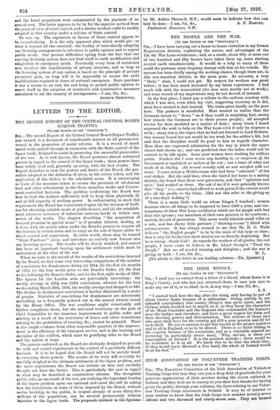THE PEOPLE AND THE WAR.
[TO THZ EDITOR OP THY " SPECTATOR-1
Sra,—I have been carrying out a house-to-house visitation in my forme*. Registration district, explaining the nature and advantages of the 15s. 6d. War Loan certificates ; and, as a result, about fifty or more out of two hundred and fifty houses have taken these up, some starting several cards simultaneously. It would be a help to many of these could the postman carry sixpenny stamps with him on his rounds. My success has been chiefly among the working classes, though these are, in this non-munition district, in the main poor. At servants, a very " likely " class, I could not get. My respect for workers was great before ; it has been much increased by my latest experiences. I had much talk with the womenkind (the men were mostly out at work) ; and some record of my impressions may be not devoid of interest.
In the first place, I must pay a tribute to the uniform courtesy with which I was met, even when my visit, suggesting economy as it did, must have seemed in fact ironical. The times press hardly on the poor here. The patience is wonderful. Moat seemed to realize that the Germans meant to " down " us if they could (a surprising fact, seeing how remote the Germans are to these poorer people) ; all accepted service for their menkind as a matter of duty ; many times I heard expressed the wish to help on the War Loan even if only by sixpence a week ; many times, the regret that we had not listened to Lord Roberts: One woman feared her son would be too weak for the soldier's life, but said that the discipline would do good to him as regards character. More than one expressed admiration for the way in which the upper classes had shown up ; and one predicted that the ladies would not be content to be idle again. Some poor women were washing for soldiers gratis. Nowhere did I come across any hostility to, or suspicion of, the Government or capitalists as makers of the war ; not a trace of what one reads of in Shirley. All seemed soundly with us and satisfied with our cause. I came across a Welshwoman who had been " ashamed " of the coal strikes. But she said that, when she visited her home in a mining district, she found that there were grievances, and that " agitators and spies " had worked on these. She ask:d me if it were generally known that " they " (i.e., miners) had offered to work gratis if the owners would give all the profits to the State. [Did not this refer to the giving up of a two-days' holiday ?"1
There is a mean little world on whose fringes I touched ; women desirous above all things to be supposed to have £300 a year, and con- temptuous of these War Loan certificates which are for people with leas than this ipeome ; too uncertain of their own position to be courteous ; entirely devoid of patriotism. This mean world inhabits small villas as a rule, and has showy little parlours (" drawing-rooms ") fitted with antimacassars. It has always seemed to me that Mr. H. G. Wells believes " the English people " to be in the main of this type or class ; that is why his books (not short stories) are so drearily depressing. But he is wrong—thank God ! As regards the workers of all grades, the real people, I have come to believe in Mr. Lloyd George's " Trust the People." But we all needed training and discipline ; and the war is giving us both.—I am, Sir, &c., W. L. [We allude to this letter in our leading columns.—ED. Spectator.]






























 Previous page
Previous page